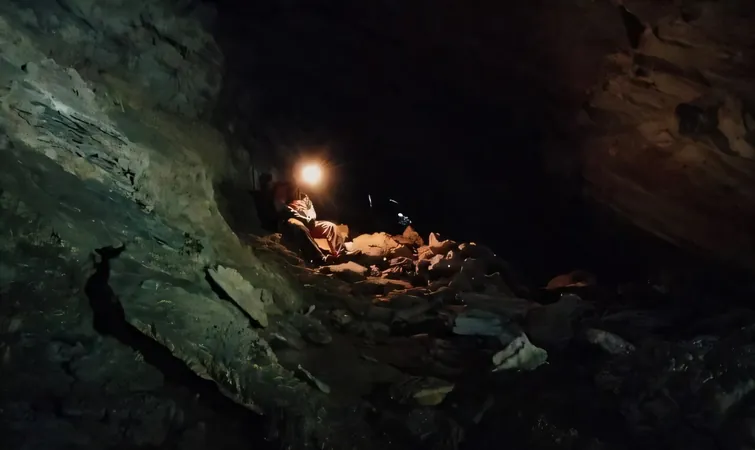
Discover the Groundbreaking Insights from a Caving Expedition on Human Cognitive Performance Under Stress
2024-12-03
Author: Mei
Introduction
In a world where lab-based research often reigns supreme in scientific studies, the real-life challenges faced by humans in extreme environments can easily be overlooked. However, a pioneering expedition led by researchers from Concordia University has shed light on how stress influences cognitive performance in challenging scenarios.
The Expedition
In a groundbreaking paper published in the Journal of Environmental Psychology, a team of researchers, guided by Emily Coffey—an associate professor in the Department of Psychology—embarked on an extraordinary mission to blend laboratory methods with the unpredictability of nature. Their objective? To gain valuable insights into cognitive performance under pressure, far away from the sterile confines of a lab.
Research Context
The research team joined an expedition organized by Spéléo Québec, exploring a complex cave system nestled in the Sierra Negra Mountains, approximately 300 kilometers southeast of Mexico City. The researchers entered the project halfway through a grueling three-week mission, where they observed participants enduring extreme conditions marked by physical exertion, isolation, and minimal comforts—a stark contrast to the controlled environments typical of traditional research.
Methodology
Hugo Jourde, the lead author and a Ph.D. student at the Coffey Lab: Audition, Sleep & Plasticity, eloquently points out, "While lab work is reproducible under tight controls, it lacks the naturalistic quality of field research. By marrying both methodologies, we believe we can cultivate a deeper understanding of human cognition in extreme situations."
Participants and Tools
The expedition, which took place in March 2023, included nine participants—a mix of men and women ranging from ages 27 to 65, each with varied caving experience. The researchers employed an eclectic mix of tools, including questionnaires, cognitive tasks, physiological metrics from heart monitors, body-mounted cameras, and personal interviews. Their mission focused on key factors such as fatigue, emotional regulation, cognitive performance, and sleep measurements for a select group.
Challenges and Implications
Despite the myriad obstacles such as physical fatigue and logistical hurdles, the research team managed to collect usable data, emphasizing the potential of future field studies despite the inherent difficulties. "Our study primarily aimed to assess the feasibility of data collection in such challenging conditions," Jourde stated. "Although we lacked the statistical power that larger samples can provide, the information we gathered is still insightful."
Significance of Findings
The findings from this unique study promise significant implications, especially for agencies such as NASA and the European Space Agency, where understanding human performance in extreme environments is crucial. Moreover, this research not only opens doors to analyzing workplace safety in hazardous settings but also offers guidance for anyone engaged in physically demanding jobs outside of caving or space exploration.
Conclusion
In summary, this innovative research uncovers the fascinating interplay between cognitive workload, sleep, and performance in extreme environments, challenging the status quo and providing fresh perspectives that could be applied across various fields. As we delve deeper into understanding human cognition, it's essential to remember that real-world experiences—from the depths of caves to the challenges of high-risk work—are invaluable laboratories in their own right. Don’t miss out on more groundbreaking revelations as researchers continue to explore the limits of human potential!



 Brasil (PT)
Brasil (PT)
 Canada (EN)
Canada (EN)
 Chile (ES)
Chile (ES)
 España (ES)
España (ES)
 France (FR)
France (FR)
 Hong Kong (EN)
Hong Kong (EN)
 Italia (IT)
Italia (IT)
 日本 (JA)
日本 (JA)
 Magyarország (HU)
Magyarország (HU)
 Norge (NO)
Norge (NO)
 Polska (PL)
Polska (PL)
 Schweiz (DE)
Schweiz (DE)
 Singapore (EN)
Singapore (EN)
 Sverige (SV)
Sverige (SV)
 Suomi (FI)
Suomi (FI)
 Türkiye (TR)
Türkiye (TR)